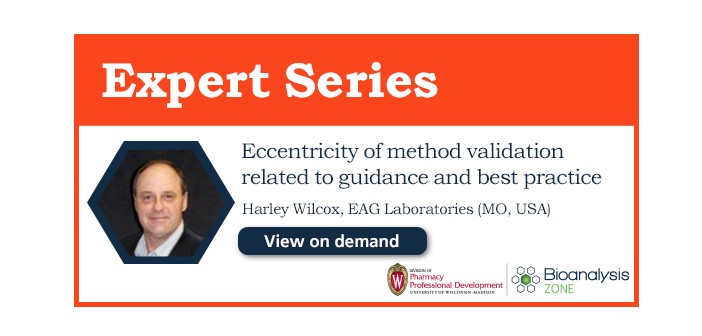Expert Series: Eccentricity of method validation related to guidance and best practices

Speaker: Harley E. Wilcox
Harley is a Senior Scientific Advisor for EAG laboratories in Columbia MO and assists new client projects, proposals generation, and acts as an interface between business development and EAG operational teams. He primarily supports small molecule analytical projects including MD/MV and stability.Oncology Drug Development—Harley’s pharmaceutical career has spanned 30 years beginning with Marion Laboratories and manufacture of API. He moved from manufacturing to NCE synthesis to support of chemical development and oncology drug discovery programs, eventually to Analytical development support of oncology drugs.
As part of a new CMC regulatory submissions group he supported global CMC team submissions. As a director of manufacturing with oncology start-up Taxolog Inc. in New Jersey, he supported three clinical NCE’s, thousands of research compounds and developed on internal analytical group. The group developed expertise in impurity ID, method development and in-vitro metabolism studies. He developed relationships with many CMO’s and CRO’s for DS and DP clinical trial manufacturing, supply chain management, as well as pharmacokinetics support.Harley received his BS in chemistry from UMKC and his MBA in healthcare management (FIT-2011). He continues with his pursuit of knowledge in science and business.
In this webinar, Harley Wilcox outlines the eccentricity of method validation related to guidance and best practices. Currently there is a fairly clear understanding of the intent of the suitability of analytical methods for pharmaceuticals. ICH, FDA guidance, literature, and USP-published information provide detail specifically for chromatographic methodology and validation and requirements for market approval. Less information exists for method suitability for early phase development and non-chromatographic methods. Stress testing, method robustness and reproducibility are often performed for registration validation but play an important role in early method development but are not exclusive of validation. How to handle early and late stage suitability and interpret possible inconsistencies in published information will be discussed. This will include case studies, and provide parameters of registration validations as well as applications to drug development stages.
Following this webinar, you will be able to:
- Explain the differences between validation and verification
- Discuss validation considerations when time and money are critical
- Describe components of accuracy
- List the most useful sources for validation reference
- Explain the validation requirements for phase III and why they should be completed for analysis of phase III material
Watch on demand
For more webinars from our expert series click here
